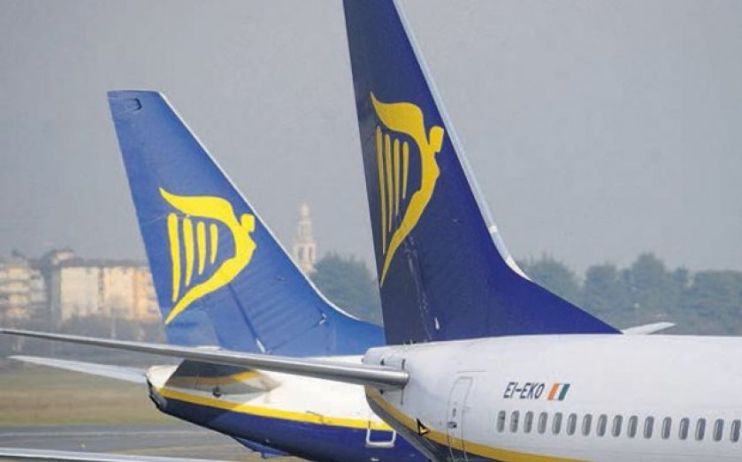Ryanair profits nosedive 21 per cent in first quarter

Ryanair’s profits tumbled 21 per cent in its latest quarter as the airline was battered by higher fuel and staff costs coupled with lower fares, it revealed today.
Read more: Ryanair warns of summer 2020 problems due to Boeing 737 Max ban
The figures
Profit before tax fell 24 per cent year on year to €262.3m in the first quarter of the new financial year, Ryanair said. Profit after tax dropped 21 per cent to €243m.
That came despite an 11 per cent rise in revenues to €2.31bn as ancillary sales rocketed 27 per cent to €795m.
Traffic also grew 11 per cent to 42m passengers as the cost of fares dropped six per cent to €36.
Net debt was flat at the end of the quarter at €419m despite a €700m share buyback launched in May, which has so far seen €100m returned to shareholders.
Earnings per share plunged 19 per cent to just €0.21 per share, down fropm €0.27p per share this time last year.
Ryanair left its full-year profit outlook unchanged, guiding to between €750m to €950m profit after tax.
Why it’s interesting
Hikes in the cost of fuel and staff were behind Ryanair’s profit drop, with its fuel bill for the quarter rising a whopping €150m over the quarter and staff costs growing 21 per cent.
Meanwhile airfares dropped considerably, as competition increased in Germany after Lufthansa bought Air Berlin and sold fares at below-cost prices.
In the UK, Ryanair blamed Brexit uncertainty, saying “concerns weigh negatively” on consumer spending.
The profit plunge was offset by “strong” added-value sales, as Ryanair charged customers to pick their seats and get priority boarding. This ancillary revenue climbed 27 per cent to €800m, and kept revenue per seat broadly flat at €55.
The profit drop comes hot on the heels of Ryanair’s warning that it will have to make service cuts to compensate for the delay of Boeing’s 737 Max planes’ return to the skies.
It was expecting to receive 58 new 737 Max jets in time for next summer, but due to regulatory issues now expects only 30m, knocking next year’s passenger numbers down 5m to 157m.
Liberum maintained a ‘buy’ rating on Ryanair’s stock despite the profit drop, saying net profit beat its forecasts of €243m by three per cent.
“Flat revenue per passenger was not enough to offset higher fuel costs and a four per cent increase in non-fuel unit costs,” the broker said.
“Unsurprisingly, the toughest markets were cited as Germany (post-Air Berlin fare war) and the UK (Brexit).”
Read more: Ryanair’s COO to step down after just 18 months in the role
What Ryanair said
Chief executive Michael O’Leary said:
“Our investment in operational efficiency, including more spares, additional engineers and new improved handling contracts in Stansted, Spain & Poland has seen our on-time performance improve more than seven per cent points in Q1 to over 90 per cent. In June 2018 we cancelled over 1,100 flights due to ATC strikes but this was reduced to just 20 cancellations in June 2019, all of which were due to ATC staff shortage delays.
“The delivery of our first five B737-MAX aircraft has been delayed from Q1 to probably January at the earliest (subject to EASA approval). We now expect to receive only 30 Max deliveries in time for summer 2020 (previously 58), which will cut Ryanair’s summer 2020 growth rate from seven per cent to three per cent.
“We have great confidence that these ‘gamechanger’ aircraft (which have four per cent more seats, but burn 16 per cent less fuel and have 40 per cent lower noise emissions) will transform our costs and our business. Due to these delivery delays, we will not now see these cost savings delivered until FY21.
“The current weak fare environment has continued into Q2 and we expect H1 fares to be down approximately six per cent.
“With almost zero H2 visibility, FY20 fare guidance is towards the lower end of our guided -2% to +1% range. However, the strong performance of ancillaries continues to support our RPP growth of +2% to +3% (previously +2% to +4%).”